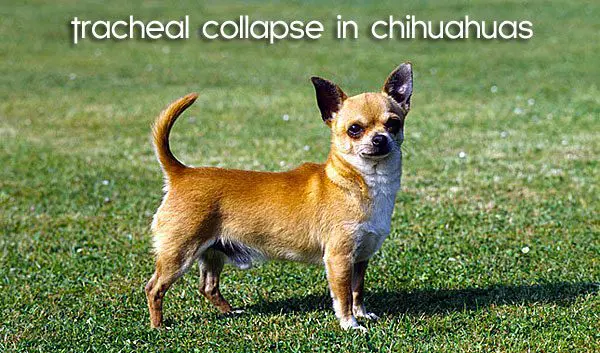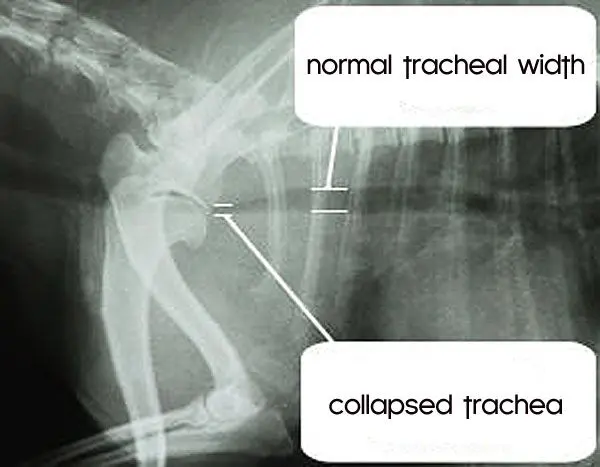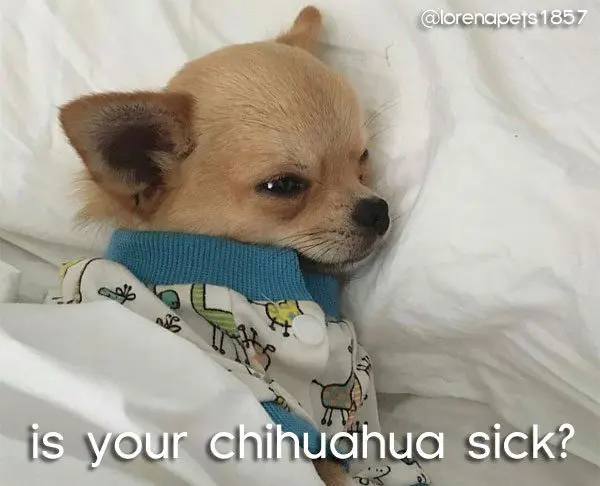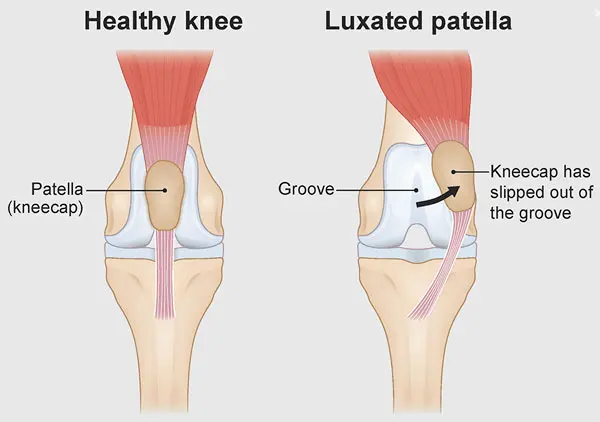
What Is A Collapsed Trachea?
Tracheal collapse in chihuahuas is a serious respiratory problem that can be chronic, progressive and unfortunately, is irreversible.
The trachea is the airway from the larnyx to the main bronchi in the lungs. It is a very sensitive area and looks somewhat similar to that of a vacuum hose and has many stiff rings with flexible tissue connecting them.
Sometimes these rings are not stiff enough and are unable to hold the trachea open against the air pressure that’s created during respiration. The portion of the trachea that is not stiff is then sucked into the airway causing partial obstruction making it difficult for your chihuahua to breath.
In addition, their abdominal muscles may become tense from the extra effort they make to breathe.
A collapsed trachea is a common chihuahua health concern that is characteristic of the chihuahua breed and is also commonly referred to as “reverse sneezing”.
Images Of A Normal Trachea Verses A Collapsed Trachea

X-ray Image

Looking down the trachea
Factors That Can Lead To Tracheal Collapse
- Obesity,
- Irritants,
- Allergies,
- Repeated heart conditions,
- Bacterial infections,
- Viruses
- And second-hand cigarette smoke
Symptoms Presented With A Collapsed Trachea
- Harsh and dry cough
- Difficulty breathing
- Exercise intolerance
- A blue tinge on the gums
- Fainting, wheezing and abnormal breathing
- Rapid breathing
Tracheal collapse can also be brought on by damage done from leash pulling, especially if you use a collar to walk your chihuahua.
It is recommended that you switch to a trachea friendly chihuahua harness to prevent any pushing or pulling against the trachea.
Diagnosis of Tracheal Collapse
If any of the symptoms above develop, take your chihuahua to the vet right away. If they are not treated, damage can occur in the lungs, larynx, nasal passages and soft palate regions.
As mentioned, there is no cure for a collapsed trachea, but there are different ways in which you can help keep your chihuahua comfortable.
Your veterinarian will also provide you with the right medications and you will be able to further prevent symptoms.
Get Your Copy of our Chihuahua eBook Delivered to Your Inbox!
The amazing ebook, Caring For Chihuahuas Made Easy teaches you about common chihuahua health problems and how to properly care for your chihuahua! It also teaches you how to extend their life span!
Below is a sample page from the section of tracheal collapse!
reference: tracheal collapse in dogs vetinfo4dogs.com/dtrachea.html
photo references: egyvetonline.com/animaldisplay.aspx?c=2&info=16








162 Comments.
Chops’s success story!
Five months ago, we had never heard the term tracheal collapse. Since that time, our six pound Chihuahua, Chops, experienced a 100% improvement from this disease.
Chops was coughing and wheezing … his overall health was deteriorating. He had lots of energy and his life-force was high, but he was struggling. Initially, years ago, his veterinarian at the time diagnosed his problem as allergies. Later, another veterinarian said he had a symptom called reverse sneezing. A year later, another veterinarian thought Chop’s problem stemmed from his vaccination history, and started him on a detox program. Finally, after his condition worsened, the last diagnosis to Chop’s dilemma indicated he was suffering from tracheal collapse.
According to the American College of Veterinarian Surgeons, tracheal collapse is a chronic, progressive, irreversible disease of the trachea, or windpipe, and lower airways (main stem bronchi collapse). The trachea is a flexible tube and, similar to a vacuum cleaner hose. It has small rings of cartilage that help keep the airway open when the dog is breathing, moving or coughing. The rings of cartilage are C-shaped, with the open part of the C facing upward. In some dogs, the C-shaped cartilage becomes weak and begins to flatten out. As the roof of the trachea stretches, the cartilage rings get flatter and flatter until the trachea collapses. The collapse can extend all the way into the bronchi (the tubes that feed air into the lungs), resulting in severe airway compromise in your pet. If you look in the blog section, attached is a full description of tracheal collapse by the American College of Veterinarian Surgeons.
By the time Chops was evaluated, approximately 40% of his trachea had collapsed. I attached a video taken during the worst stretch of this problem. You can hear him struggling for air as he went on one of his daily walks. (I then attached a follow-up video a couple of months later, after I had confirmation from his veterinarian of his progress.)
About three months prior to the video where Chops began walking again without wheezing, Alan and his wife Joy began giving him Life-force blessings. Alan and Joy had been studying this procedure since 2010, and realized that this was the time to begin to treat Chops. At the same time, his veterinarian prescribed a cartilage boosting supplement in hopes of thickening and strengthening his trachea, along with some dietary changes to Chop’s eating habits.
Chops had his first follow-up evaluation one month later and his veterinarian said it appeared that the degeneration had stopped and his overall cartilage condition was indicating approximately a 10% improvement. According to her diagnosis, this was significant and not very typical after such a short time span.
Alan and Joy continued the Life-force blessings and reached out to other colleagues who were also studying on this same program. He found nine additional practitioners willing to work with Chops and administer Life-force blessings on a remote basis from all around the United States.
In total, Chops now had ten individuals administering these blessings to him on a daily basis.
His second follow-up was exactly one month following his first evaluation. This time, his veterinarian estimated his overall improvement to be 60%. She also tested the percentage of his trachea that was collapsed and found that to only be 30% collapsed, which was down from her original finding of 40% one month earlier.
The only way to express the significance of this evaluation is to go back to the American College of Veterinarian Surgeons definition to understand that trachea collapse is considered by the veterinarian profession to be an irreversible disease with no known cure.
Chops had his third follow-up with his veterinarian, one month after his last evaluation. The latest estimated overall level improvement in his cartilage consistency was 90%. The percentage of his trachea that was collapsed as of April 16, 2018 was slightly less than 20%.
Success continued with the fourth follow-up visit too. Again, after another month, on May 16, 2018, the overall cartilage consistency improved to 98% and the percentage of his trachea that was collapsed was approximately 9%, down from slightly less than 20% one month earlier.
Several months later, Chops’s improvement was diagnosed as 100% and our veterinarian told us we could even stop giving him the cartilage boosting supplement he was taking.
Here is Chops wheezing. I recorded this and sent this to his vet to help diagnose the problem.
https://www.youtube.com/watch?v=TynADgQeNSo
Here is Chops two months later. If you listen carefully, there is no wheezing … This was taken after he had been diagnosed with about a 60% improvement.
https://www.youtube.com/watch?v=gTYESs1g0og
So I’m hoping someone can help me here find peace. I just lost my 7 year old long haired apple head Male. He was soon to be eight. The night before I lost him he seemed to be breathing a little heavy, nothing alarming, he ate all his food, and felt ok enough to try instigating my other long hair who is 4 years old. Then he started coughing alot. He would cough here and there everyday. I thought his allergys where just bothering him. So I gave him the allergy meds from the vet, they said to give in emergencies. I figured if he was still acting a lil funny I would take him to the vet in the morning. But again nothing alarming or that he hasn’t done before. I woke up to a traumatic experience my poor baby, my best friend, was barely breathing on the floor. I rushed him to the vet, didnt make it , said he died before he made it there. I payed for autopsy nothing. I’m left with a broken heart guilt and the loss and pain of him not being there. With no answers as to what happened.
I feel like this could help my 8 year old Chihuahua female
I do complete background searches of any and all of ANY medical practice that is involved with my family. Regarding my Chihuahua, I recently switched to a Veterinarian that has the ability to do ultrasounds! This is somewhat unusual for Vets around here and I had to shop around to find one that was not going to beat my wallet silly too. I found that there is a “traveling Doctor” that visits this area, the various doctors, per a schedule BUT she also has a “floating scale” of charging!!! My former Vet was going to charge me $500 for the event but after shopping around I found another extremely well qualified Vet where the fee by the same provider is to be $340.00!! Now, I also have been carrying “Dog Insurance” for some time so I’m not out of pocket the whole cost but my point is that if your pet is getting older the crappy excuse of, “well, she’s just getting old and just like you and me…” garbage does not work for me – I WANT FACTS not excuses. And be forward with ANY medical practitioner — THEY WORK FOR YOU, you are their boss. I’ve fired attorneys, doctors, and now a Veterinarian as I continue to not be victims of their apathy or complacence. I’m 71 years old and intend to double that age (*chuckle*) and the same goes for my pets and family. Sorry for the digression but I always see people on various sites “wondering if” but never knowing what to do. Look for a Vet that will is UP TO DATE with the newest information, is respectful to you and not just doing “10 minutes and on to the next patient” (like human medical providers TRY to pull on me), will “hand check” the WHOLE ANIMAL when it comes in for it’s appointment and not just focus on one target area, can provide discounts to those who are Seniors, or otherwise, even payment plans – but PAY THEM NO MATTER WHAT HAPPENS, and I’ve even had Vets that will call AFTER a serious situation to telephonically check on the animal’s status.